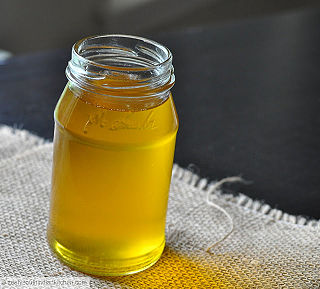Ghee
To some it's known as clarified butter, to others it's the golden elixir of healing - ghee is a staple ingredient in Indian cooking and Ayurvedic healing known for its versatility, great taste, and many health benefits. It's derived from butter through a process of cooking off its milk solids until it becomes an easily digestible, healthier alternative to butter and oil, and it can be used for cooking or as an ingredient to add flavor and richness to foods such as kitchari.
Contents
Special Precautions of Ghee
Like butter, when ghee is consumed at levels above 10% total calories, it can increase risk of cardiovascular disease. (For a person consuming 1,800 calories per day, 10% of those calories would be 180 calories, or about 20 grams of fat, which equals approximately 2 tablespoons of ghee.) At levels under 10% of total calories, however, ghee appears to help lower cardiovascular risks, especially when other fats consumed during the day are exclusively from plants or plant oils.
The benefits of Ghee are
- Cooking benefits
- Excellent cooking oil - Since ghee doesn't start smoking until it's heated to 375 degrees Fahrenheit, it will neither burn nor splatter easily. Its chemical structure also remains more stable than other oils when heated.
- Stores well - Thanks to its low moisture content, ghee can go weeks without refrigeration. It can last up to six months in the fridge or one year in the freezer, according to the Ayurvedic Institute. The key to ghee longevity: store it somewhere cool, keep it covered, and make sure it doesn't get contaminated by other liquids - don't double dip!
- Flavorful - Thanks to its strong flavor, not much ghee needs to be added to a dish to make it sing.
- Health benefits
- Easily digestible - The process of cooking off milk solids from butter burns off its lactose and cholesterol (says Holistic Chef Shani Cranston of hOMe Grown Living Foods). This makes it much easier to digest than butter or vegetable oils.
- Cholesterol : Research shows that ghee safely increases blood lipids without raising LDL cholesterol. This means that it does more than simply lower total cholesterol. It raises the good kind (HDL) and lowers the bad (LDL).
- Anti-inflammatory - According to the Sushruta Samhita, a text of the ancient Indian healing system of Ayurveda, ghee is the ultimate anti-inflammatory food.
- Heart Disease : Ghee also reduces inflammation and prevents heart disease. One study found that men who consumed two tablespoons of ghee a day lowered their risk for heart disease by 23 percent.
- Rich in the oil soluble vitamins, A D and E.
- Rich in K2 and CLA (Conjugated Linoleic Acid) – an antioxidant with anti-viral properties if it is sourced from grass fed cows.
- Healthy Digestive Tract : Research shows that people with unhealthy digestive tracts do not produce butyric acid.
- Healthy Immune System : Research shows that adequate production of butyric acid supports the production of killer T cells in the gut, and thus a strong immune system.
- Anti-Inflammatory and Anti-Cancer : Researchers are using oral butyrate supplements and butyrate enemas to treat inflammatory bowel diseases such as Crohn’s and ulcerative colitis.
- Nutritionally Rich Like Coconut Oil : Ghee is rich in medium chain fatty acids which are absorbed directly to the liver (like carbs) and burnt as energy. Athletes can use ghee as a consistent energy source.
- Molecules of Emotion : Modern research is now revealing that negative emotions have a chemical nature. This is what ancient cultures have always maintained, that the mind and body are one. These chemicals are attracted to and stored in fat. Ghee can be used to replace those fats. Plus, if used properly in a cleanse, can attract and pull out these emotional toxins so they can be cleansed from the body.
- Weight Loss : The energy from these medium chain fatty acids can be used to burn other fats in the system and lose weight.
Ayurvedic physicians have been using ghee enemas for centuries to decrease inflammation.
- Whole body healing - Ayurvedic practitioners use the golden elixir for everything from rejuvenating skin to aiding digestion to balancing hormones.
- Flexibility - Dr. Vasant Lad, founder and director of the Ayurvedic Institute, explains ghee's popularity among yogis by stating that it lubricates connective tissues and makes the body more flexible.
- Enhances your essence - As reported by Paul Pitchford in Healing with Whole Foods: Asian Traditions and Modern Nutrition, ghee boosts ojas, the underlying essence of body issues; this leads to an increased immune system and greater longevity.
- Increases agni - In Ayurveda, proper digestion revolves around agni, the body's digestive fire. Consuming ghee boosts one's agni, leading to better digestion and faster metabolism.
- Positive Food : Within Ayurveda, ghee is considered one of the most satvic foods. Satvic foods promote positivity, growth and expansion of consciousness.
- Holy Cow : The positive subtle effects of ghee is said to come from the fact that it comes freely from cows. Cows are special or holy because they receive and store thousands of spiritual energies from the environment. The milk from cows therefore contains the essence of all those energies and ghee is the essence of the milk.
Ghee recipe
1. Melt 1 pound of unsalted butter in a heavy saucepan over medium heat. Add 3 or 4 cloves if you wish. This will aid in the clarification and lend a delicate flavor.
2. As soon as the butter begins to boil and foam, reduce the heat to a simmer. Keep the melted butter at a steady simmer until it is golden in color and no foam remains on top.
3. When the crackling sound stops, the ghee is ready.
4. Cool the mixture and strain it into a sterile quart jar. Discard the curds from the bottom, as they are almost pure cholesterol.
